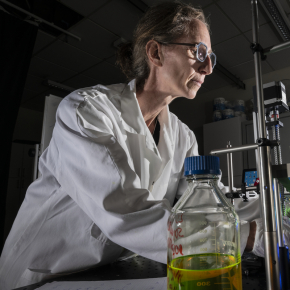
The 2024-2026 gender equality action plan: Aiming to "transform a collective dynamic into tangible action"
To mark the International Day for Women and Girls in Science on February 11th, the CNRS will be publishing its new action plan for gender equality in the workplace. This plan is a great deal more than a response to a legal obligation. It provides a real opportunity for all stakeholders – from the CNRS governance to its laboratories – to appropriate gender equality policies and actually drive change themselves.
The CNRS has been strongly committed (French link) to professional gender equality for over 20 years now. This is a priority issue for the CNRS which was the first higher education and research institution to set up a dedicated structure, the Mission for Women's Integration (French link) (MPDF). "Guaranteeing the same recruitment, career progression and salary conditions for women and men is an essential challenge for our society and the CNRS alike", as the Chairman and CEO Antoine Petit has explained forcefully and with conviction. Elisabeth Kohler, the director of the MPDF, has noted that "a true dynamic has been driven over the last few years". At the CNRS there is more and more talk of gender equality which represents true change as does the growing number of stakeholders getting involved in implementing concrete actions. All the CNRS Institutes are represented on the CNRS Gender Parity Committee (French link) and some have already implemented highly structuring actions within their own scientific communities. The CNRS regional offices have appointed their own equality correspondents and organise many actions in favour of gender equality at regional and local levels. More and more laboratories are taking up the issue and now have their own equality officers. A total of nearly 500 such officers work in networks coordinated by the regional offices or alternatively by the Institutes. "We aim to transform a collective dynamic into tangible action in all CNRS units and structures", explains Elisabeth Kohler.
Analyse, understand, act – the plan's foundations
This action plan is far from just a simple response to a legal obligation set out in the Civil Service Transformation Act1 aiming, as it does, to find tangible solutions of professional gender inequalities. To define the most appropriate actions to be taken, the MPDF bases its work on an analysis of the figures from the 'Single Social Report' and the findings of various in-depth studies and surveys at the CNRS on subjects like pay gaps. It also of course refers to the wealth of international scientific literature on the mechanisms that lead to inequalities like gender bias, the impact of parenthood and sexism.
This new action plan was constructed jointly with various stakeholders (the Human Resources Department, Gender Parity Committee, representatives of regional offices and laboratories) before being approved by the CNRS general management and unions. It follows on from the 2021-2023 plan (French link) by extending and reinforcing certain actions while also paving the way for work in new areas.
- 1The Civil Service Transformation Act dated August 6th 2019 is a wide-ranging and vast reform. Its objectives are part of the 'Action Publique 2022' programme aimed at speeding up the transformation of public services in France, in this case particularly by enhancing the exemplarity of French public administrations as regards ethics and professional equality.
Putting gender bias right by attracting, recruiting and promoting employees
The dwindling pool of female candidates in fields like mathematics (French link), physics, digital engineering and engineering sciences shows that it is no simple matter to attract women to scientific careers. Studies have shown that from the age of six onwards, children integrate the idea that women are inferior to men in scientific and technical disciplines. "We need to raise awareness of these persistent social stereotypes which are sources of inequality throughout people's careers and implement measures to counter their effects", explains Elisabeth Kohler.
As previously, the CNRS will continue its communication campaigns aimed at making scientific careers more attractive to young women (French link), particularly through the promotion of female role models. New mentoring schemes (French link) will be introduced to provide better career support for young female PhD students and post-doctoral fellows.
Many of the actions on the recruitment and promotion of female researchers implemented in the framework of the previous plan will be renewed and reinforced, given their positive results. Thanks to these actions the proportion of women recruited as researchers will be much higher in the 2020-2022 period at 39.4 % than in the previous period (36.3 % between 2017 and 2019). However, only a small proportion of the workforce is renewed each year which means the impact of these recruitments on the proportion of women in the overall workforce remains low with 34.3 % of female researchers in 2019 moving up to 34.7 % in 2022. However, the 'glass ceiling' effect has been lessened. The proportion of female research professors rose from 30.1 % in 2019 to 31.7 % in 2022 while the percentage of unit directors rose from 22.4 % to 25 % in the same period.
Therefore the following actions will be maintained or strengthened for the 2024-2026 period:
- Continuing to raise awareness of gender bias among members of the National Committee for Scientific Research's (CoNRS) sections and interdisciplinary committees (CIDs).
- Maintaining the presence of gender advisors in these sections and CIDs.
- Continuing to apply the principle of 'cascade' promotions whereby the proportion of promoted female researchers is equal to or greater than the proportion of those eligible for promotion.
- Bolstering career support for women's access to supervisory and management positions.
- Increasing the number of female unit directors.
In the previous plan, such measures primarily targeted female researchers' careers but the 2024-2026 action plan aims to extend these measures to engineers and technicians (ITs). "We need to break through the current glass ceiling. Parity has been achieved among IT staff overall but when we look higher up the hierarchy there are less women (32 % among research engineers compared with 66 % among technicians). We also need to do all we can to increase the gender mix in these professions. Only 12 % of the BAP C (engineering sciences and scientific instrumentation) are women compared with 84 % in BAP J (management and steering)", explains Elisabeth Kohler.
New actions have therefore been included in the gender equality plan for 2024-2026:
- Raising awareness of gender bias among members of recruitment and promotion selection boards for ITs.
- Promoting non-stereotypical job descriptions.
- Bolstering the attractiveness of male-dominated professions for women and vice versa.
- Raising awareness of gender stereotypes and bias among management staff who are in charge of annual career assessments.
All these actions will also contribute to reducing the pay gap. The mechanisms of this were analysed in depth in the 2021-2023 Gender Equality Action Plan.
Reducing the impact of parenthood on careers
All current studies show women bear the main burden of parenthood so support for parents is another major issue. Maternity leave and parenthood have a major impact on women's careers and can negatively affect the number of publications female scientists produce and their participation in calls for projects and scientific events. The following measures implemented under the previous plan are to be extended: financial support for research units to enable fixed-term contracts to be extended for last as long as a period of maternity leave; the recommendation to use working time planning charters or pre- and post-maternity or parental leave interviews; adopting criteria to reduce the impact of maternity leave on the assessment of applications by the CoNRS sections; encouraging fathers to take paternity leave and take part in parenting support interviews.
The 2024-2026 gender equality plan also features new initiatives:
- Maintaining full annual allowance bonuses for women who take maternity leave.
- Ensuring staff who have taken maternity leave or part-time parental leave are promoted in equal or greater proportion to the overall total of those eligible for promotion.
Measures to cover childcare costs (temporary crèches, etc.) may also be implemented within the limits of current national regulations.
Preventing and combating gender-based and sexual violence
Several studies at the CNRS and at national and international levels have found sexist or sexual violence to persist in higher education and research. The CNRS implemented strong measures set out in the 2021-2023 plan to deal with this, namely setting up a reporting unit and hotline for victims and direct witnesses of such abuse. Many awareness-raising and training sessions were also organised for unit directors and laboratory equality officers. To take the development of its policy of preventing and combating gender-based and sexual violence even further, in the 2024-2026 period the CNRS will continue and reinforce its awareness-raising and training initiatives for management staff and all staff members.
Overall implementation of equality policies
Finally, the 2024-2026 action plan goes further than its predecessor by proposing to integrate equality into all CNRS policies, such as international cooperation for example. Another of the plan's stated objectives is to raise the profile of research into equality and gender mainstreaming in the humanities and social sciences, the biological and health sciences and artificial intelligence. Elisabeth Kohler concludes that "as a research organisation, the CNRS has to demonstrate the importance of establishing equality policies that are based on scientific results and also respond to societal challenges".





